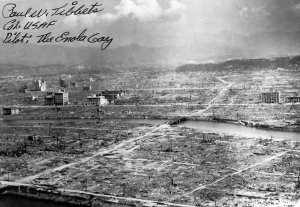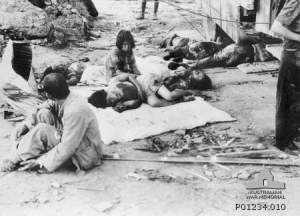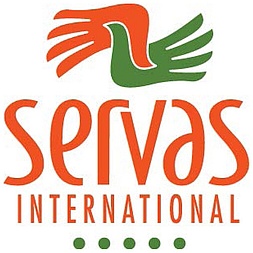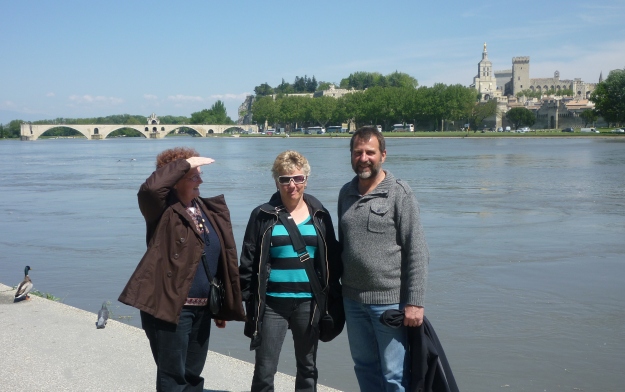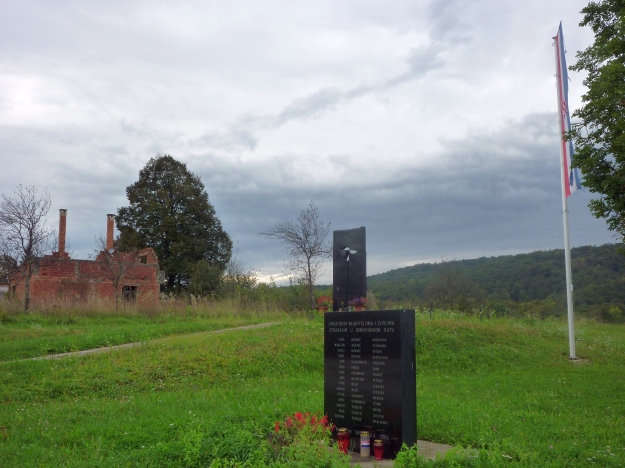It was on the Island of Korčula that two opposing visions began to converge.
While we were cycling in the southern Dalmatian Islands of Croatia, one of our riding companions began to exclaim at every opportunity, “We are so lucky!”
“Why is that?” I asked.
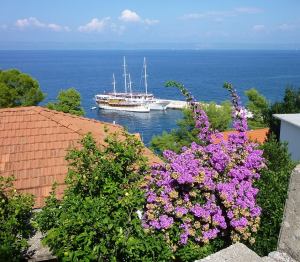
Our transport awaits at Prigradica, Korčula
“Look at us,” Heather would say. Here we are, riding on this beautiful island on a warm September day. Friends, all in good spirits, surround us. Everywhere we look, there are stunning vistas. We get back to our luxurious yacht for a fine meal, and first we go for a swim in this clear, warm Adriatic ocean. The roads, the villages, and the countryside are so peaceful. Think of all the people who aren’t able to be here and enjoy this right now. “We are so damned lucky!”
While I couldn’t fault Heather’s logic, after hearing this several times a day, it began to grate on me. So I asked one of our guides for a translation into Croatian. “Mi smo tako sretni,” he said. It had a ring to it – once I got the pronunciation right – so I began to prod my shipmates with this from time to time. “Mi smo tako sretni!” The phrase began its work while we began to absorb some of Korčula’s history.

A small-town church on Korčula
While today, this island of anglers, vignerons, and hosteliers feels pretty laid back, it was not always so. The history of invasions and takeovers reads like a “Who’s Who” of the continent.
Between 1000 BC and 900 AD, Korčula was invaded by the Illyrians, the Greeks, the Romans, the Slavs, and the Byzantine Empire. Then the pace picked up. Over the next 500 years, the Island’s rulers included the Serbian kingdom of Raška, the Slavic kingdom of Zahumlje, the Republic of Ragusa (Dubrovnik), the Republic of Venice, the Croatian kingdom of Krka, the Hungarian monarchy, the Republic of Genoa, Venice (again), the Kingdom of Hungary (a couple more times), the Kingdom of Bosnia, the Serbian Kingdom of Zeta, and finally ended up back under the thumb of Venice in 1409.

Impromptu a capella performance. Some say that Marco Polo was born in Korčula during its Venetian occupation
In 1571, the Islanders repelled an Ottoman Turkish attack, and then – except for frequent attacks by pirates – things settled down. However, in 1797, a new series of takeovers began, including the Hapsburg Monarchy of Vienna, the French under Napoleon, the Kingdom of Montenegro, France again, the British, and finally ended up under the rule of the Austrian Empire in 1815.
During WWI, the Island was caught between the Austro-Hungarian Empire and the Italians (after they switched sides.) Italy won out in 1918, but in 1921, Korčula became part of the Kingdom of Yugoslavia. For the first two years of WWII, the new central authority was the Banovina of Croatia, but between 1941 and 1944, the Island fell under the control of Mussolini’s Italy, then the communist Yugoslav Partisans, then Nazi Germany, and finally the Allied Forces.

Close call. Not far to the Pelješac Peninsula on the mainland.
After 1945, the Socialist Republic of Yugoslavia was in charge, until Croatia declared its independence in 1991. The war for independence largely bypassed Korčula although most of the nearby Croatian coast was less fortunate. However, it would seem that the Islanders have had to endure a considerable helping of violence and upheaval over the past three thousand years.
As the reality of this history began to sink in, I began to see our good fortune in a new light. Because my grandparents located in a relatively peaceful part of the western hemisphere – one that was to become quite prosperous – I have not had to grow up in the shadow of war and cycles of violence. Instead, I had the opportunity to become better off financially than the overwhelming majority of the world’s inhabitants. We can afford to cruise the Dalmatian Islands on a well-appointed yacht, and have our every need catered to. As our friend Heather said, “Mi smo tako sretni.”

Mi smo tako sretni – we are so lucky. Near Lastovo.
As we toured a number of other areas in Croatia and nearby, the contrast between our good fortune and the recent suffering of others kept bubbling up.
It started in Dubrovnik as we sat with our friendly Airbnb host on his balcony, admiring the spectacular view of the Old Town spread out below us. Not twenty years earlier, our host had been unable to venture onto the balcony for fear of sniper fire from Yugoslav forces on the hilltop above. At age 13, he was stuck inside with his grandmother, while his parents worked as medics in a nearby war zone.

From high on Srđ, destruction rained down on Dubrovnik
Later, on top of that same hilltop – Mount Srđ – we could see the view the gunners would have had as they shelled the city of Dubrovnik below. Built as protection from medieval forces, the famous walls were of little use in protecting the citizens from late-20th-century armaments. Srđ now hosts a sobering museum filled with photographs of taken during the siege of Dubrovnik. As you wander the streets with thousands of other happy tourists, it’s hard to imagine the pain and destruction of the 1990s.

The rustic shelters high up Mt Velebit served as refuge from coastal pirates for centuries
In the Islands, there are echoes of slightly more distant wars. The Island of Prezba, adjacent to Lastovo, was a Yugoslav military base during the Cold War. With the Italian coast less than 200 km distant, this area would have been part of the front-line in the 45-year standoff between East and West. Now, fortunately, the island flora is reclaiming the fortifications. Up the coast, similar tunnels dug into the base of Mt. Velebit will become a new tourist attraction next year. Perhaps Tito intended to hide out here if the Russians and Americans started lobbing nukes at each other.

Mostar from the Bridge. A war zone not so long ago.
In the middle of our week of cycling, our tour bused us all out to the city of Mostar in Bosnia and Herzegovina. Mostar is famous for the Old Bridge (Stari Most) after which it is named. The bridge, now a UN Heritage Site, was built in 1566 when Bosnia was under Ottoman rule. During the ethnic fighting that took place in Bosnia in the mid-1990s, the bridge was destroyed. In 2004, the bridge reopened, having been reconstructed from original plans and using original material that had fallen into the river during the bombardment. It now serves as a symbol of peace.

Remnants of war for sale at the Mostar bazaar.
Still, the signs of the recent war are all around in Mostar. Plaques in the market read, “Never forget 1993.” A cross on the hill above town commemorates some of the victims of the war. Here and there between the tourist shops are the bombed out shells of buildings that have yet to be reclaimed from the fighting. In the part of town that divided Croat from Bosniak ethnic groups, apartment buildings are still pockmarked in shrapnel wounds. It’s sobering to imagine what those years must have been like. Over 100,000 people died in the Bosnian conflict. Today however, the only visible conflict seems to be among tourists for open-air tables or the best views of the young men who once again jump off the new Old Bridge.
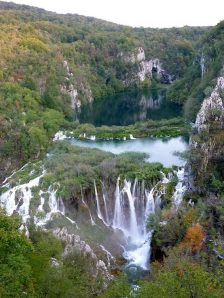
Some of the falls at Plitvice Lakes
The week after our cycling trip, we traveled to Croatia’s famous Plitvice Lakes National Park. This is a unique region of unparalleled beauty, where calcium-laden rivers of unbelievable shades of blue create a “Land of Waterfalls.” It’s impossible to convey the scope of this landscape with a single picture. As you walk down the trails and boardwalks, it’s as if you are right in the middle of the cascading falls. Between the falls are peaceful lakes, and the entire scene is surrounded by forest.
Our home for five nights would be right in the park, in the small village of Korana, nestled on the banks of the same river that sculpts the waterfalls. Just a handful of houses, Korana boasts one of the few still operating water-powered grain mills. Our accommodation in a private home had no WiFi. The valley walls blocked cell phone reception. As we walked along the bank of the river that first early Fall evening, the smoke curled peacefully up from the woodstoves. The tranquility carried with it a soothing balm for the soul. But there is pain that lies beneath.

Our home at Korana Village – peaceful once again
Our host explained to us that most of the homes had been destroyed during the Croatian conflict. All the men had spent a year in prisoner-of-war camps run by enemy militias. “If they seem a little strange now,” he said, “perhaps you’ll understand why.”
Right in the beautiful park at Plitvice were fired some of the first shots of the conflict that would rage for three years. Plitvice was the centre of the area of Croatia known as Krajina, which stretches in a big arc along 40% of the Croatian-Bosnian border. During the Middle Ages the Austrian Empire encouraged large numbers of Serbs to settle in this area as a “buffer” against the Ottoman possessions in Bosnia. In recent times there were several hundred thousand Serbs living in this area, with some areas having more Serbs than Croats. In 1991, as the Croatian government prepared to declare its independence from Yugoslavia, the Serbs in Krajina jumped the gun and declared their own republic independent of Croatia. When the war broke out, most of the Krajina Serbs sided with the Serb-controlled Yugoslav government. The fighting that ensued must have been brutal.

Plitvice changed hands four times during the fighting.
As we toured the area around Plitvice, most notably in Karlovac and the surrounding countryside, we pondered the still stark signs of devastation. Almost every home in this region had been war damaged. Apart from ruins that had not been salvaged, numerous homes were still peppered with shrapnel damage, almost 20 years later.
In the countryside around Karlovac, we passed extensive areas that appeared to be reverting to nature, with trees and bushes growing up around the ruins of farmhouses. From time to time, signs warned of uncleared landmines. Some of these areas were formerly populated by Serbs, but several hundred thousand left Croatia during and following the war.

Open air war museum in Turanj, a suburb of Karlovac
Traveling through these areas really got me thinking about how hard many people have it. Meanwhile, Cheryl and I live in a peaceful, prosperous country. It’s not too difficult for us to afford a trip like this, where we can eat well, be well looked after, and have guides show us around or entertain us. We get to sail to beautiful islands on a yacht, or hike through beautiful national parks, or spend the day cruising the countryside on comfortable bicycles.
As our cycle guide explained it, “Mi smo tako stretni.” can mean either “We are so lucky” or “We are so happy.” Could this linking of “happy” and “lucky” offer a small insight into the Slavic temperament? Or perhaps we just need to acknowledge some of the good fortune in our happiness. “Mi smo tako jako sretni!” We are so darned lucky!
Related Posts:
If You Want to Follow in Our Tracks:

Enjoying the peace of an evening stroll in Korana
Our five-day stay in Korana Village in Plitvice was arranged by Huck Finn Croatia Adventure Travel. It’s a reasonably priced and somewhat different way to see this part of Croatia. Our guide, Zlatko, picked us up in Zagreb, and spent the next four days leading us on a number of activities around the area: the waterfalls of Plitvice Park, hiking on Mt. Velebit, cycling in the Karlovac countryside, and rafting on the Mrežnica River. Each evening we enjoyed traditional meals in the riverside cookhouse in Korana. Zlatko turned out to be an accomplished classical guitarist, and one evening played a selection of his own arrangements of Balkan flamenco from Macedonia. Our group definitely enjoyed Huck Finn’s Croatia.

Some of us are very lucky. Some not.
One of our most memorable activities in Dubrovnik was a visit to the galleries of War Photo Ltd. on Antuninska Street, just off the main thoroughfare. According to their promotional literature, “It is the intent of War Photo Limited to educate the public in the field of war photography, to expose the myth of war and the intoxication of war, to let people see war as it is, raw, venal, frightening, by focusing on how war inflicts injustices on innocents and combatants alike.” There are several photo exhibits about the conflicts in Croatia and other parts of former Yugoslavia, but there are also revolving displays on war’s human costs in Northern Ireland, Syria, Chechnya, Colombia, Israel, Lebanon, and other hot spots. We spent a sobering couple of hours there, and once more came away thinking, “Mi smo tako sretni!”
Like what you read?
A little encouragement for our authors goes a long way:
- Please “Like” and/or “Rate this” post (directly below or on Facebook)
- Share it using one of the icons below
- Comment on the posting (or on Facebook)
- Follow this blog using the “Follow” or “Like” buttons on the right
- Or send us an email, thanks.


